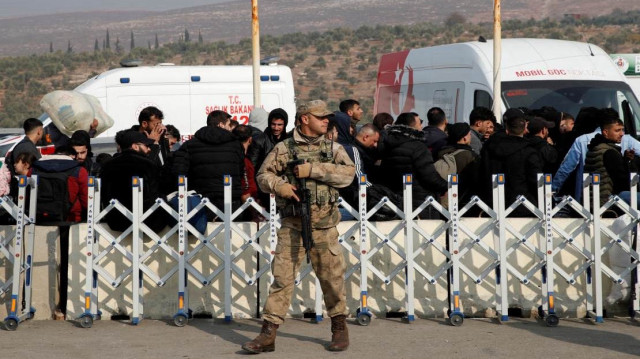
‘I am confident that 14 million Syrians will return to their country in two years. Only around 1 to 1.5 million will remain (abroad),' says Ahmed al-Sharaa
The leader of Syria's new administration, Ahmed al-Sharaa, expressed optimism that 14 million displaced Syrians would return to their country within two years following the fall of the Bashar Assad regime.
Speaking to Dubai-based documentary filmmaker and YouTube content creator Joe HaTTab in a video that aired Sunday, Al-Sharaa emphasized that following the collapse of the 61-year-old Baath regime in December, Syrians who were forced to flee their homeland are already returning.
"I am confident that 14 million Syrians will return to their country in two years. Only around 1 to 1.5 million will remain (abroad)," he said.
Al-Sharaa criticized the ousted regime for using state institutions to suppress and dominate the population, organizing institutions to oppress people and resorting to tactics like torture and killings.
He outlined his administration's commitment to justice as a foundational principle for Syria's reconstruction and development.
"If the state is weak, the citizens of that country cannot be strong," he said, underscoring the need for short-, medium- and long-term plans for public institutions, legislative and executive bodies and other sectors during this process.
He also noted that addressing the current challenges in society will take time but can be achieved through consistent planning and public education.
Al-Sharaa said the Syrian people overcame their despair through the revolution.
"Now, Syrians hold their heads high everywhere. We have changed the course of history."
He emphasized the harmony among all segments of society, noting "there is social consensus in Syria. Thanks to this, for the first time in Syria, people will be able to live together with love."
He highlighted that the revolution has been completed with the regime's collapse and it is time to transition from a revolutionary mindset to a state-oriented one.
Describing the new administration's goal as "victory without vengeance," he supported reconciliation efforts and an amnesty policy for those who switched allegiances after the regime's fall.
Al-Sharaa made exceptions, however, declaring that those involved in torture, barrel bombings or massacres, such as those at Sednaya Prison in the capital Damascus, would not be granted amnesty.
Assad, Syria's leader for nearly 25 years, fled to Russia after anti-regime groups took control of Damascus on Dec. 8, ending the Baath Party's decades-long regime.
The takeover came after Hayat Tahrir al-Sham fighters captured key cities in a lightning offensive that lasted less than two weeks.
A new administration led by Al-Sharaa has now taken control of the country.

